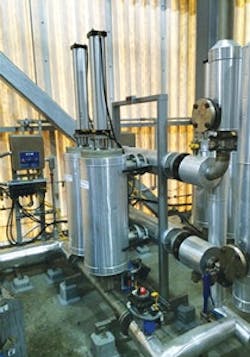Filtration: Heavy Metal Management
About the author: Margaret DeAngelis is global marketing communications manager for Eaton. DeAngelis can be reached at [email protected] or 732.212.4703.
Titanium is one of the essential materials used in a range of aerospace applications due to its light weight and high strength.
Global Titanium of Detroit, an integrated manufacturer of titanium metallurgical products, purchases excess titanium chips and turnings from manufacturers around the world. Each month, the company recycles more than a million pounds of this material for use by producers of titanium, steel, stainless steel, aluminum and powder metallurgy products.
These valuable chips are crushed and subsequently washed with water on a side hill screen, which captures the large pieces and allows particles less than 230 µ in size to pass through the screen into the wastewater stream. The resulting wash water is recycled on site through an ultrafiltration system and is reused to comply with environmental regulations.
Titanium Particles
The company found that the smaller titanium particles were damaging the ultra filter, making the use of a pre-filter necessary. Global Titanium’s goal was to recover the titanium particles as an additional source of recyclable material while handling more than 100,000 gal of water daily used in the washing process. Global Titanium also needed an automatic self-cleaning filter using permanent media to minimize downtime and maintenance.
“The titanium chips contain every kind of contaminant imaginable: coolant, dirt, plastic and cardboard,” said Jesse Oliver, plant engineer for Global Titanium. “The primary contaminant is cardboard, which produces long, stringy fibers that are hard to handle.”
Finding a Filter
The customer brought in an Eaton DCF-800 mechanically cleaned filter on a trial basis to test the feasibility of pre-filtering the wastewater stream.
“The startup went well, although the solids loading was high, requiring a purge every 10 minutes,” said Bruce Law, regional sales manager for Eaton. “The customer was encouraged by the filter’s performance and the amount of titanium that was retained.
“The retention rate of several different elements was tested and it was eventually determined that the 0.006-in. (150-µ) slotted element would be the best solution because it efficiently removed titanium particles while maintaining the required system flow and pressure.”
DCF mechanically cleaned filters are efficient and operate at consistently low differential pressures, delivering simple, reliable operations. The filter consists of a cylindrical stainless steel housing that holds the filter media, in this case a slotted element. Fluid enters the element and flows through to the outlet, depositing contaminants on the inside of the element.
A spring-loaded cleaning disc moves up and down the length of the filter, wiping the element clean and depositing the contaminants at the bottom of the housing, out of the flow path. Because the filter remains in service while being cleaned, the filters support high process efficiency while minimizing cleaning-related product loss and costly downtime.
After evaluating the results of the test system, Global Titanium purchased two DCF self-cleaning filters after the completion of the trial period. Both units currently are being used to protect the ultra filter from two different water sources in the plant. When evaluating the best possible location for the new filters, the flow rates indicated that the customer needed to purchase the larger capacity DCF-1600 models rather than the DCF-800 that was used in the trial. Both of the DCF-1600 filters purchased use 0.006-in. media to handle the volume of wash water with an extended purge cycle.
“The Eaton filters are part of a large water treatment project that helped reduce the company’s water consumption by 75%,” Oliver said. “The filters are working as expected, and the customer service from Eaton has been outstanding.” Based on the amount of particulate retained and water savings, the company estimates a return on investment of less than six months.
Download: Here
